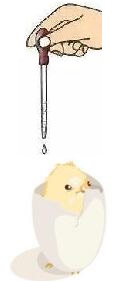Normally a budgerigar baby will get out of the egg shell at the 18th day if the mother bird has a good motherhood and no external interference. But if the baby bird hasn’t come out after 18-19 days, it may be due to the inappropriate temperature and humidity. At this situation, we should observe and
intervene it manually if necessary.
(Please be noted here we are talking about the budgerigar’s incubation time, different birds have different incubation times.)
At the 17th-18th day, put the egg to your ear and you will hear the sound of the baby bird pecking at the egg shell. If the baby bird cannot break out of the egg shell in 24-48 hours, especially if the baby bird fails to come out in 12 hours after breaking a small hole, it’s very likely that the baby birds is too weak to come out (you can hear the sound of the baby bird pecking at the eggshell becomes weaker comparing with before), when broken hole exists too long, the moisture contentinside the egg may dissipate and make the baby bird dry and stick to the inside eggshell.
In such a situation, a manual intervention should be conducted. Peel the eggshell carefully along the hole (or use the flashlight to penetrate the egg with strong light for locating the baby bird inside the egg, and break a hole in the blank place). Be careful not to hurt the baby bird. The baby bird’s skin may stick to the inner shell due to the low humidity. Carefully grasp its feet or wings and try to pull it out with slight force, but if fail to get the baby out, the baby’s skin should stick to the inside egg shell. We can use warm water (hand feel to the body temperature) to drop it at the junction between the skin and the inner shell, and wait for a few seconds, it will be easy to drag the baby bird out. Be careful not to let the baby bird get cold from the wind. Dry the baby bird right away with a dry cloth or a tissue. Then put the baby bird back into the nest.

Generally, the baby birds that are hard to get out of the shell are often the smallest ones for their mothers are busy to feed the first babies without giving the rest eggs a normal incubation temperature . Also they are far from the first baby birds in body size. They are likely to be often stepped on by their parents, brothers and sisters, and they are even hard to compete for food with the other bigger baby birds (That’s why in the wild, the first babies are the strongest and the late borns oftenly died.). It’s better to feed it alone for some days. After five or six days, when the baby’s size can catch up with the others, we can put it back to the nest (I fed the baby bird with Nestle infant rice powder.)
